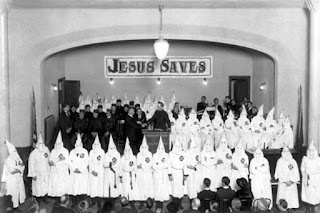This church is indeed a “White Church” and their brand of Christianity – if one is willing to call it Christianity at all! – needs to be identified as a particular, peculiar, and baleful form of “White Christianity.” But this is not what I am talking about when I speak of “White Church” or “White Christianity.” Please know that.
When I use the term “White Christianity” I am not speaking of active racist attitudes, active exclusive practices, or 100% European stock membership. I am using the term to become more aware of historical-cultural characteristics that often go unnamed and unnoticed. For example, the Presbyterian Church (USA) has a designation for some of its churches as “Racial Ethnic Congregations.” In the Presbytery of Los Ranchos there are 46 congregations, 19 of which are designated as “Racial Ethnic Congregations.” Among them is New Hope in Orange, which was an intentional startup church for the purpose of reaching out to African Americans. There is the Vietnamese Presbyterian Church in Garden Grove, which has one service in Vietnamese and a simultaneous service for young, second-generation members in English. There are nine Korean congregations, three Taiwanese congregations, two Hispanic congregations, an Arabic, Indonesian, and an African congregation. Each of them has deliberate practices for the sake of reaching out to persons who share a common story.
But, if those churches are the “Racial Ethnic” churches, what are the rest of us? What are we at St. Mark? Do we lack race? Are we without ethnicity? Of course not. We have – on one hand – a significant variety of racial and ethnic roots among us. And we have – on the other hand – a common set of practices and assumptions that enable us to be “one.” Those commons practices and assumptions (whether good nor bad) are what I am trying to discern in these posts, because some of them are wonderful and need to become even more pronounced among us, and some of them are subtle and make us more biased and exclusive than we might imagine.
Until next time,
Mark of St. Mark
True Story. Someone at my church had a father whose ministry took them to Rustburg, VA (not far from where I grew up) where he was to serve a Baptist Church. As it was their tradition, he expected to preach a Sunday night weekly service but the local Klan informed him that he would not be permitted to do that since worship at that time (when the Klan met), would reveal who was absent from church because they were at the Klan's secret gatherings. #morethanawful
ReplyDeleteYeah, what an odd working relationship. I read once that during a Camp Meeting of the Pentecostal Holiness Church the KKK came by (on horses, if my memory serves) and brought a bag of money for the offering. The church refused to accept it. I need to go back and revisit that story because it actually surprises me a little bit.
Delete